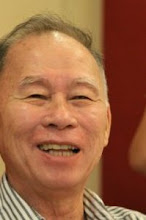NUNILO
This is a
story that just has to be written. It’s about someone who lives such an
outstanding and selfless life but keeps a very low profile making me feel
uncomfortable just writing about him. He is unassuming to a fault. A voracious reader, up to this date, he even
takes post-graduate online courses.
When Corazon my younger sister contracted end-stage kidney desease, Nunilo, my selfless elder brother readily donated one of his kidneys allowing her to continue normal life for an extra 25 years. His sacrifice enabled her to give birth to Celeste
I will
therefore request those closest to him to comment and in effect, add, if not
approve this article about him.
Being a
writer-historian he introduces himself thus: “I was born in Manila, at the Mary
Johnston Hospital on Quesada St., overlooking Manila Bay. The North Harbor area was still under the sea
then and Calle Bangkusay, which is now some distance from the sea, was then the
shoreline of Tondo.
My parents
were schoolmates at the Bulacan Provincial High School in Malolos and my father
had been wooing my mother since high school.
Father was a senior Bachelor of Science in Commerce student at the
University of the Philippines while Mother was in fourth year of her Bachelor
of Science in Pharmacy course at the University of Santo Tomas when they were
wed, and “Tatang” had to find a job.
Having to mix work and studies, he only got his diploma the year after
their marriage. When they were married,
“Inang” had stopped her studies, as it later turned out, for keeps. We lived in
a rented accessoria, as budget-priced apartments were then called, on Calle
Ilaya, very near the Tondo parish church.
UP was then on Padre Faura St. in Ermita district, Manila while UST was
where it continues to be, along España Blvd.”
Nony is my
elder brother, less than 2 years my senior. My earliest memory of him was that
he was someone to emulate. So I would
always be at his side. When I started reading aloud, he would correct me: I
remember specifically the words “bureau” and “gathered”- words that I
mispronounced literally like buryaw
and gat-her-ed. I learned so well
that my grade school teacher, a nun, told my mother that she had to look up
such words as kinky in the dictionary because she did not know there were such words.
I lost track
of him when he started high school in Malolos, while I went ahead to the big
school in Manila. He was in a different league when he also transferred to
Ateneo college. We had our own school barkadas.
Cousin Josie
Pena and he were classmates in high school at Immaculata Academy. Both were at
the top of their respective classes. Nony almost gave up his designation as
valedictorian of the boys’ class, because he shunned delivering the
valedictory speech. Josie had no problem delivering her valedictory speech.
Tampoy Tales
included my story in our early years.
He enrolled
in Ateneo Padre Faura – finished LittB, a liberal arts course, which allowed
him to work in various sales jobs, one of which was Del Rosario Brothers.
I remember
another joint altercation. Sometime in 1958, while I was job-hunting, I
was hiking in the underdeveloped area of Pasig towards Resin Inc., where I was
to be interviewed by Ito Carlos, along came a US Tobacco van to rescue me from
the dust and the sun. Yes, it was my KUYA who took me to Resins. I did not take
the job because I could not readily commute to Resins in the wee hours of the
day or night.
When we 6
siblings were already studying in the big city, we stayed in a rented house in
Vermont St., Malate in Manila. This house was within walking distance to Ateneo
in Padre Faura and St. Paul College along Herran St. Two years later, when the Ateneo moved to
Loyola Heights in Quezon City, we moved again, this time to a brand new
bungalow which Inang had purchased on South 12th St. (later to be renamed Dr.
Lazcano St.) near Sacred Heart Parish, Quezon City, two bus rides and a
fifteen-minute walk from my college classes at the Bellarmine Hall, overlooking
Maryknoll College.
That South
12th St. house was to serve as a residence of quite a few close relatives. Cousins Diana, Inday and Tessie lived there
during their college studies. Joby was
there during the early years of his working career. Tio Carlos stayed with us whenever he had to
visit the Department of Public Works head office in Port Area, Manila.
He quotes: “I did not
know it then but that initial move to Manila would be the last time I would see
myself as a resident of Tampoy. I would
be back later for various reasons; I even stayed in Tampoy for a year when
northern Bulacan province and southern Pampanga were my sales territories in
one of my first jobs after college. None
of these later visits would be quite the same as before. I guess the “Huckleberry Finn perspective”
with which I looked at Tampoy in my early years was no longer there. The Tampoy of my childhood was gone and there
was no returning. Of the more than a
dozen houses I have lived in, it is only Tampoy that appears when I dream of
home, probably because my most memorable early experiences happened there.”



